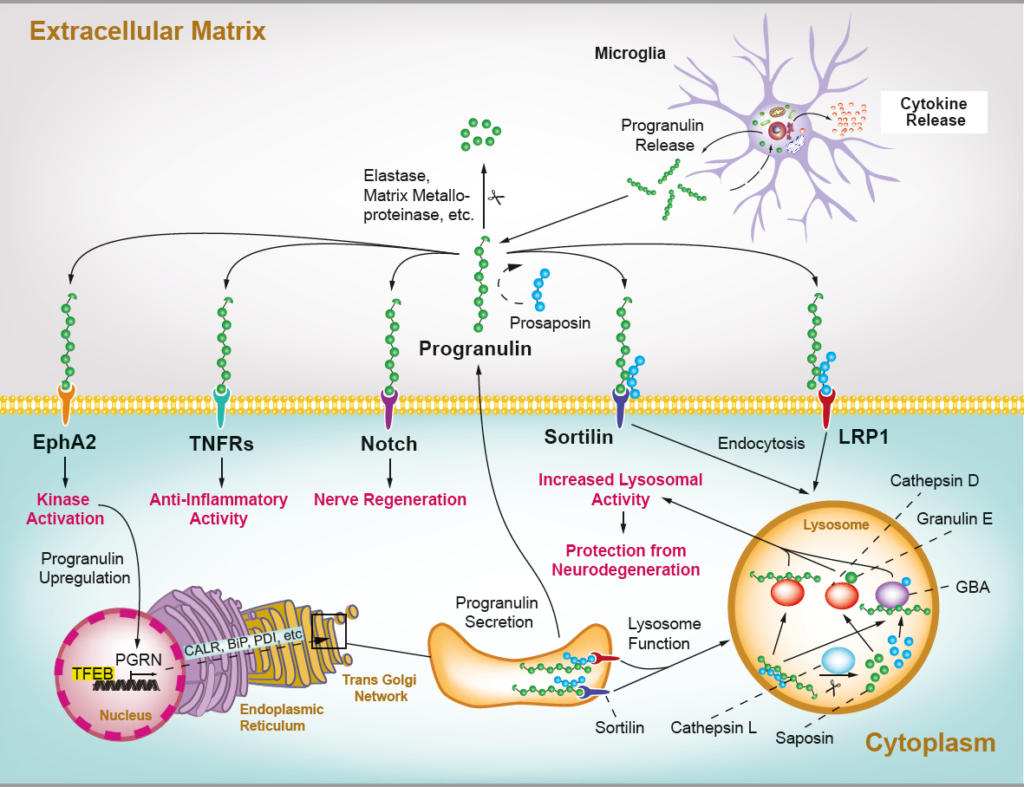
Progranulin (PGRN) is a cysteine-rich protein, composed of seven ~6kDa granulin (GRN) proteins, that shows multifunctional biological activities, including major roles in cancer, inflammation, metabolic disease and neurodegeneration, especially as a valuable biomarker for Frontotemporal Lobar Degeneration (FTLD). PGRN is an abundant, non-conventional, stress-induced, extracellular matrix-bound secreted growth factor-like molecule and cytoplasmic chaperone, that functions in a cellular and disease-specific pattern. PGRN binds to several functionally different receptor families in a cell/tissue-specific and condition/disease-dependent manner. For example, PGRN binding with TNFR and DR3 has an important anti-inflammatory role in immune cells, particularly Tregs and macrophages. PGRN/Ephrin type-A receptor 2 (EphA2) interaction is involved in the proliferative influence of PGRN. PGRN binds and activates Notch receptors, enhancing the regenerative capacity of injured neurons. PGRN is also a lysosomal resident protein and sortilin and lipoprotein receptor-related protein 1 (LRP1) have been demonstrated to be the lysosomal trafficking receptors for PGRN with the help of Prosaposin. In the brain, PGRN is primarily expressed in mature neurons and microglia. The absence of progranulin in microglia causes increased production and release of multiple cytokines, suggesting that PGRN regulates microglia activation. PGRN seems to affect microglial proliferation, recruitment, differentiation, activation and phagocytosis, suggesting that PGRN plays a central role in the regulation of neuroinflammatory responses. In neurons, PGRN i) co-localises in late endosomes and early lysosomes with the transmembrane protein TMEM106B, ii) co-localises with markers such as BDNF along axons, iii) influences synaptic structure and function at synaptic and extra-synaptic sites, where it is secreted in an activity-dependent manner, and iv) extracellular PGRN is endocytosed and delivered to lysosomes. The lysosomal function of PGRN is not well characterised, but probably involves the regulation of proteins such as cathepsins, glucocerebrosidase (GBA) or TMEM106B and likely contributes to neurodegeneration.
Progranulin expression in plasma predicts GRN mutation status, independently of symptom onset proximity. Progranulin loss-of-function mutations are among the most frequent genetic causes, responsible for 20% of familial FTLD. If a patient carries a mutation in the progranulin gene, it can be detected using AdipoGen’s Progranulin (human) ELISA Kit. This is the only kit on the market detecting all mutations of Progranulin [4]. See their Unique ELISA Kits, Proteins and Antibodies.
Literature References:
- Progranulin, lysosomal regulation and neurodegenerative disease: A.W. Kao, et al.; Nat. Rev. Neurosci. 18, 325 (2017)
- The lysosomal function of progranulin, a guardian against neurodegeneration: D.H. Paushter, et al.; Acta Neuropathol. 136, 1 (2018)
- Progranulin: A conductor of receptors orchestra, a chaperone of lysosomal enzymes and a therapeutic target for multiple diseases: Y. Cui, et al.; Cytokine Growth Factor Rev. 45, 53 (2019)
- Plasma progranulin levels for frontotemporal dementia in clinical practice: a 10-year French experience: L. Sellami, et al.; Neurobiol. Aging 91, 167 (2020)
Unique Reagents for Progranulin Research
Progranulin (human) ELISA Kit (mAb/mAb)
Mutations in Progranulin (GRN) have been reported to cause FTLD through haploinsufficiency. Mutations in GRN account for 5-10% of all the FTLD cases, leading to an approximately 50% reduction of the precursor protein Progranulin. Decreased levels of Progranulin protein predict GRN mutations, even in pre-symptomatic carriers more than four decades before disease onset. Screening of individuals with GRN mutations can be made by Progranulin measurement in serum and plasma using ELISAs and confirmed by molecular analysis of the GRN gene.
The new Progranulin (human) ELISA Kit (mAb/mAb) (Prod. No. AG-45B-0027) is a sandwich ELISA for the specific quantitative determination of human Progranulin in serum, plasma and cell culture supernatants. This ELISA Kit shows both high specificity and high sensitivity of 100% for detecting GRN mutations in an FTLD patient cohort, which makes this ELISA Kit an ideal assay to improve the precision of Progranulin analysis in the screening of GRN mutations.
Specification:
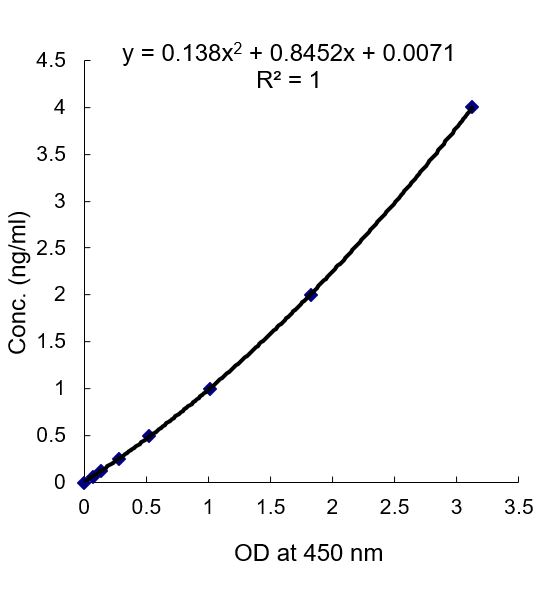
Sensitivity, Limit of Detection: 0.06 ng/ml
Specificity: Validated on Mutated and Null GRN plasma samples. Detects human Progranulin in cell culture supernatant, serum and plasma samples.
Range: 0.063 ng/ml – 4 ng/ml
Intra-assays and inter-assays: <9%
Concentrations of Progranulin plasma levels in FTLD and healthy samples:
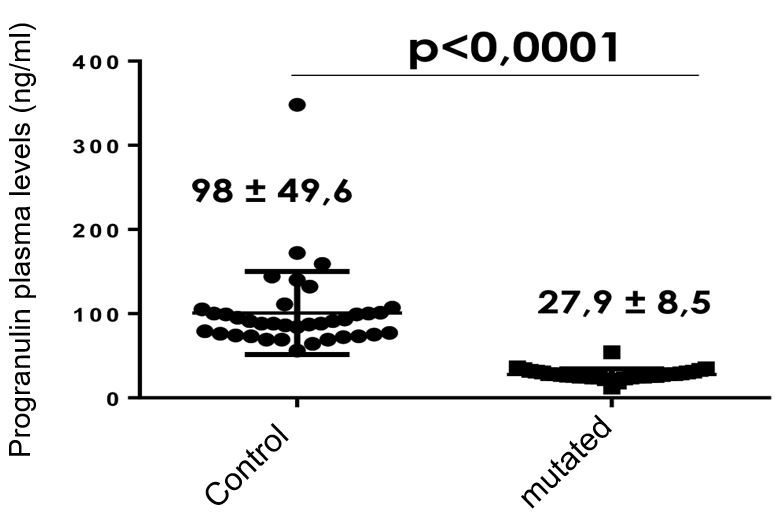
Using the new mAb-based ELISA kit (AG-45B-0027), plasma progranulin levels in FTLD-GRN are lower (~28 ng/ml) compared to controls (~98 ng/ml).
ROC curve of the new ELISA Kit:
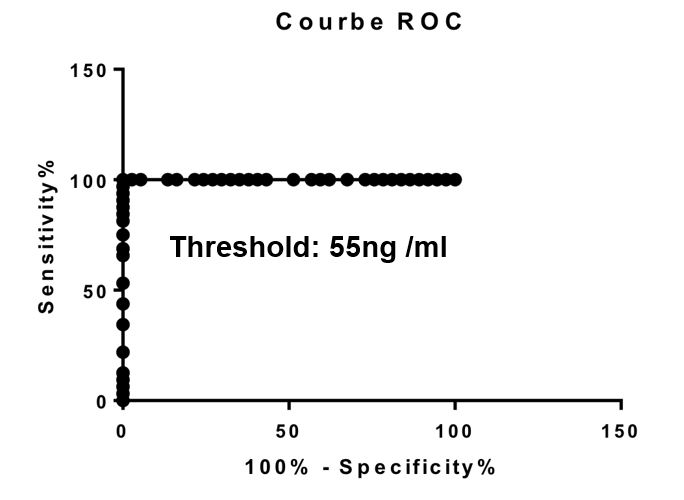
ROC analysis shows that at a threshold of 55 ng/ml plasma progranulin measured with ELISA Kit (AG-45B-0027) discriminates FTLD-GRN patients from controls with 100% sensitivity and 100% specificity.
STANDARD – Progranulin [PGRN] ELISA Kits
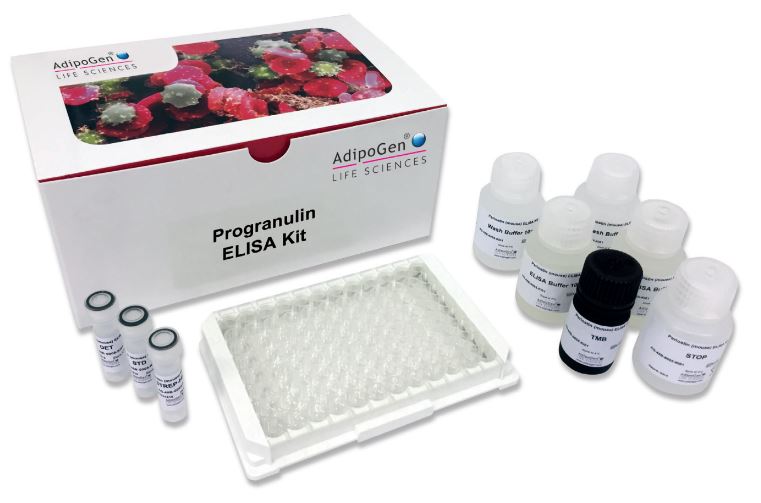
Progranulin (human) ELISA Kit – AG-45A-0018Y
Progranulin (mouse) ELISA Kit – AG-45A-0019Y
Progranulin (rat) ELISA Kit – AG-45A-0043Y
Trusted Reproducible Results!
• Used to Determine Cut-Off values for FTLD!
• Cited in Hundreds of Scientific Publications!
TAG-FREE – Progranulin Recombinant Proteins
Progranulin (human) (rec.) (untagged) – AG-40A-0188Y
Progranulin (mouse) (rec.) (untagged) – AG-40A-0189Y
Progranulin (rat) (rec.) (untagged) – AG-40A-0196Y
Higher activity compared to tagged progranulins (binding to Sortilin)
• Suitable for in vitro and in vivo studies
• Reflects the native sequence with no additional amino acids
• Affinity purified
• Low endotoxin levels (<0.01EU/µg)
Sortilin [Progranulin Receptor] Research Reagents
Sortilin (human) (rec.) (His) – AG-40B-0229
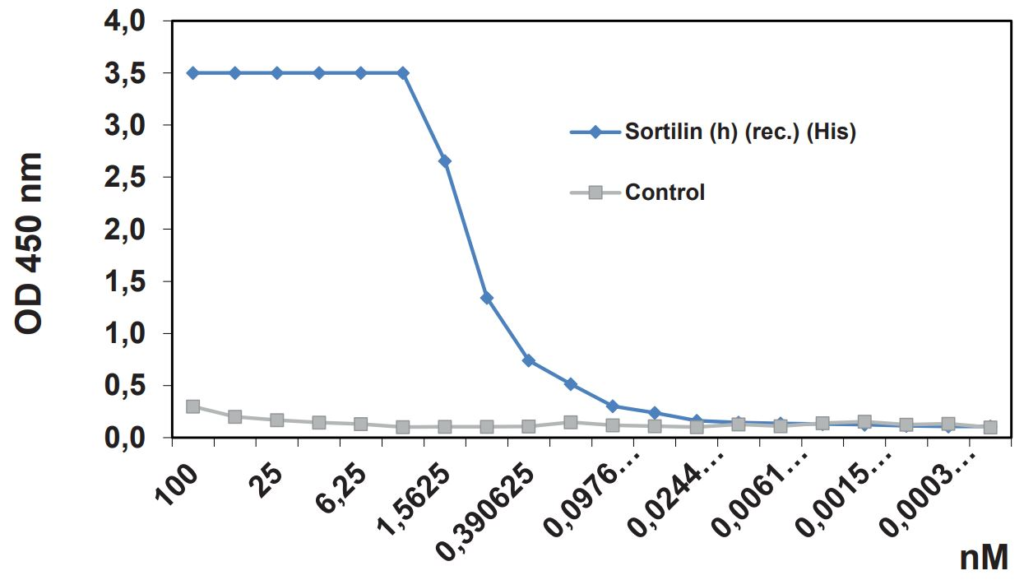
Specification:
Progranulin (human) (rec.) (untagged) (Prod. No. AG-40A-0188Y) is coated on an ELISA plate at 1 μg/ml overnight at 4°C. Sortilin (human) (rec.) (His) (Prod. No. AG-40B-0229) or a control His tagged protein (Prod. No. AG-40B-0177) is added (starting at a concentration of 100nM with a twofold serial dilution) during one hour at RT and the interaction is then detected using an anti-His antibody coupled to HRP.
Anti-Sortilin (human), mAb (rec.) (blocking) (preservative free) [Latozinemab] – AG-27B-7000PF

Specification:
Binding of Progranulin (human) (rec.) (untagged) (Prod. No. AG-40A-0188Y) to Sortilin (human) (rec.) (His) (Prod. No. AG-40B-0229) is inhibited by the antibody Sortilin (human), mAb (rec.) (blocking) [Latozinemab Bioimilar] (Prod. No. AG-27B-7000PF).
Progranulin Antibodies, Tagged Proteins & Related Products
| Product Name | PID | Product Description |
| anti-Progranulin (human), pAb | AG-25A-0112 | Recognises human progranulin. Detects a band of ~90kDa by Western blot. Weakly cross-reacts with mouse progranulin. Cross-reacts with hGRN-C and hGRN-F. Works in Immunohistochemistry and Western blot applications. |
| anti-Progranulin (mouse), pAb | AG-25A-0093 | Recognises mouse progranulin. Detects a band of ~90kDa by Western blot. Weakly cross-reacts with human progranulin. Works in Western blot application. |
| anti-Granulin C (human), pAb | AG-25A-0090 | Recognises human granulin C. Detects a band of ~12kDa by Western blot. Cross-reacts with human progranulin. Works on recombinant protein in Western blot application. |
| Progranulin (human) (rec.) | AG-40A-0068Y | Human progranulin (aa 1-593) is fused at the C-terminus to a FLAG®-tag. Activates ERK phosphorylation in THP-1 and MCF10A cells and induces cell migration of THP-1 monocytic leukaemia cells. |
| Progranulin (rat) (rec.) | AG-40A-0194 | Rat progranulin (aa 1-602) are fused at the C-terminus to a FLAG®-tag. |
| Granulin C (human) (rec.) (His) | AG-40A-0129 | Human granulin C (aa 364-430) is fused at the N-terminus to a His-tag. |
Originally posted on adipogen.com/progranulin-pgrn
Caltag Medsystems is the distributor of Adipogen products in the UK and Ireland. If you have any questions about these products, please contact us.
